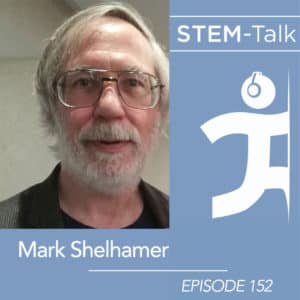STEM-Talk: Dr. Mark Shelhamer on human spaceflight and missions to Mars
Published 5.18.23
Mark Shelhamer was set upon a path that would take him from “nerdy band kid” to the chief scientist for NASA’s Human Research Program by his Uncle Stanley.
“One of the smartest people I knew, even though he was not highly educated,” Shelhamer says. “He had been a surveyor in a coal mine. He was ‘the cool uncle,’ so he made it cool to be interested in science and math.”
Uncle Stanley also gifted 10-year-old Mark with a Radio Shack 150-in-1 Electronics Kit. The idea that he could wire up a radio in a few minutes and listen to broadcasts from hundreds of miles away on something he built with his own hands, “was magic to me.”

Dr. Mark Shelhamer on Episode 152.
He’s been using that magic ever since in a career spent learning about spaceflight and its impact on human beings. In this STEM-Talk, Shelhamer talks about his work with NASA and as an advisor to the commercial and consumer spaceflight industry.
Shelhamer is an otolaryngology professor at the Johns Hopkins School of Medicine and is the director of the school’s Human Spaceflight Lab. He also the director and founder of the Bioastronautics at Hopkins initiative
This fascinating discussion covers his role in NASA’s planned human mission to Mars and how he is investigating ways to maintain the health and performance of astronauts on long-duration spaceflights. He also discusses how this knowledge could be applied to improving healthcare on Earth.
Episode 152 is now available on IHMC’s STEM-Talk webpage, as well as on your favorite podcast platform. Tune in for the conversation hosted by Dr. Ken Ford, IHMC’s founder and CEO, and co-host Dawn Kernagis, which covers:
- How Shelhamer’s family ties to nursing led him to biomedical engineering, and ultimately, Massachusetts Institute of Technology and Johns Hopkins University.
- Shelhamer’s research into motion sickness and vestibular issues and his more recent work on Space Motion Sickness.
- Hiss belief in the need for a multidisciplinary approach to human space flight research — and how that approach could improve healthcare systems on Earth.
- How close he believes we are to another exciting time with NASA’s Artemis program and plans to return to the moon.
- His work on the effects of space radiation on people as well as the behavioral risks of being confined with a small group of people in tight quarters on a long-duration spaceflight.
Latest News
- David Bear joins IHMC Board of Directors
- STEM-Talk: Michael Schmidt on building a space-faring civilization
- Florida Blue award supports health and wellness research and outreach at IHMC
- STEM-Talk: Ken Forbus on AI and his development of the Structure Mapping Engine
- STEM-Talk: Pascal Lee on returning to the Moon — and heading to Mars
- Aging Symposium draws experts to IHMC
- IHMC hosts Fredric G. Levin Lung Care Symposium March 27-28 in Pensacola
- Humanoid robotics and exoskeletons lead latest IHMC newsletter
- Celebrate Robotics Week at IHMC Open House on April 11, 2025

